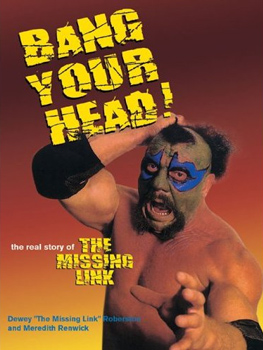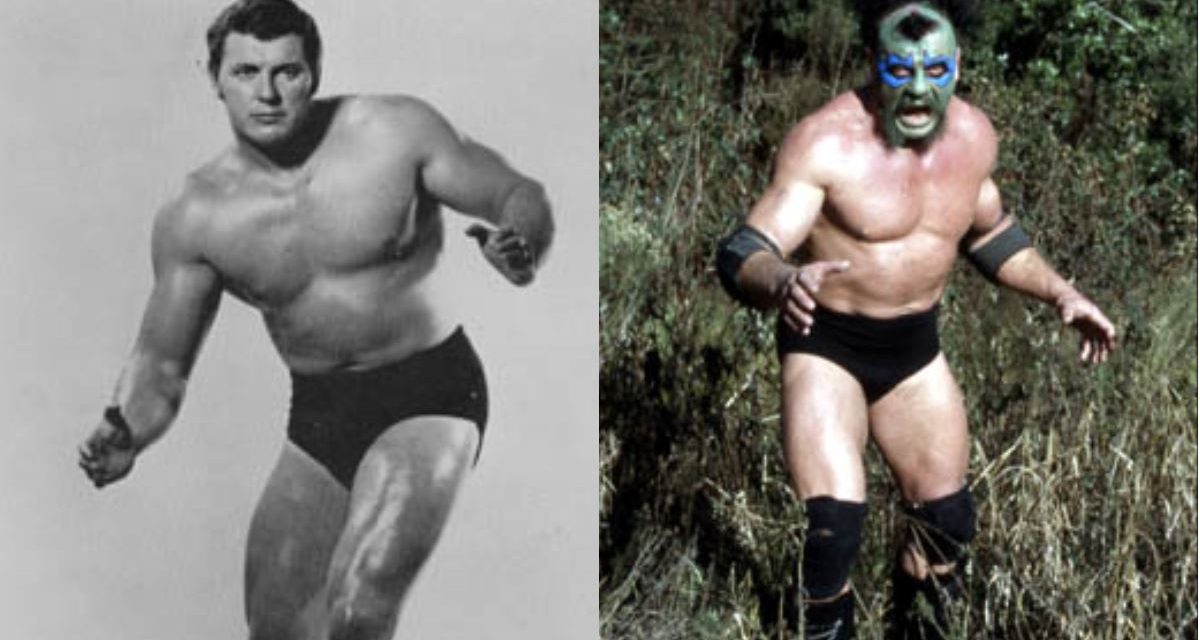Okay, I’ll admit that I had reservations when I first sat down to read this book. After all, there’s a picture of a man with his face painted, pulling at a hairdo that would make only a Neanderthal proud. On top of it, the book is called Bang Your Head!

However, after reading the first line, I knew I was in for something much different than what the cover was advertising.
“Hi. My name is Dewey Robertson.”
To me, this line sets the tone of the book — conversational, personable, and down to earth.
Bang Your Head! The Real Story of the Missing Link is about the life of “Dewey” Byron James John Robertson — wrestler, husband, father, and addict.
The book takes the reader from Robertson’s early childhood days, to his career as a professional wrestler and business owner, to his life as it is now.
The book pulls no punches as Robertson speaks openly about the industry and his problems with alcohol, drugs, steroids, and infidelity, to name a few. The story also ventures into the former grappler’s family life and how his career and addictions destroyed many close relationships, including his marriage.
Bang Your Head!, as told by Robertson and written by Meredith Renwick, begins with Dewey describing his early life, which included an alcoholic father and a fascination with sports. Like most Canadian kids, Dewey’s initial dream was to become an NHL hockey player. However, he also held an interest in the wrestling shows he’d watch on TV, which provided him a source of entertainment, but also an outlet for frustrations brought on by his troubled home life.
Both aspects would prove instrumental in Robertson becoming a gifted athlete, and subsequently lead to his introduction into the world of sports entertainment, although considered “professional wrestling” back in Robertson’s day.
Before becoming a wrestler, Robertson focused on professional body building, working out at a gym owned by former British Empire wrestling champion Al Spittle. It was during this time that Robertson started to take an interest in wrestling, training with Jack Hill.
Through Hill, Robertson learned the basics of wrestling — holds, how to fall, etc. Spittle’s gym eventually closed, but fortunately for Robertson a wrestling school opened in its place. The school was operated by Benny Lima, who Robertson went on to train under. It was during this time, while also working as a lifeguard, Robertson met a woman, Gail, who would eventually become his wife and life support throughout his career.
Robertson’s first taste of wrestling came while training with Lima. Bruno Sammartino, who at this time was booking guys for the Pittsburgh territory, phoned Lima looking for four “jobbers” to work live Saturday TV shows. Robertson’s name was put forward, and with that the young Canadian made his wrestling debut at the age of 24.
Robertson’s wrestling career spanned over several decades, with a number of highlights and low points along the way.
Robertson recalls winning numerous championships, bouts with names such as Harley Race, Ric Flair, and Hulk Hogan, and getting his family involved in the business, with his sons becoming wrestlers and wife playing the role his valet once becoming the Missing Link.
The Canadian grappler also recalls his own transformations, going from a baby-face wrestler, to a masked hero known as the Crusader (teaming with Billy Red Lyons), to his most well-known persona The Missing Link.
Robertson shares tales of infidelity on the road, his long-term addictions to alcohol and marijuana, and his dependence on steroids. As well, Robertson recalls the toll these demons took on his body, mind, and family, particularly the abuse his wife suffered as a result.
Robertson also shares personal lows he and his family endured as a result of his career and addictions. These stories of sacrifice and woe include multiple family moves, Robertson’s wife pawning personal items so the couple could afford food, and a time when the couple was forced to rummage through a restaurant dumpster for a meal.
Other crucial highs and lows in the Link’s life include Robertson’s successful Canadian Heavyweight Championship bout with Greg Valentine in 1979, his first brush with death in an alcohol- and drug-related car accident, a time when he sold his son’s car to a friend for $1, a stint with the WWF in 1985, bouts with anxiety and depression, being diagnosed with cancer in 1993, a suicide attempt, and the eventual end of his marriage.
While Robertson’s tragic stories, accountability for his actions and uncanny honesty make this book a must-read to wrestling fans, the real strength of Bang Your Head! comes from the book’s writing.
The Toronto-based Renwick employs a writing style that any reader can appreciate — the use of clear and simple language, crafted in a way that makes you feel as though you are sitting in the same room listening to Robertson tell his tale.
Another feature of the book is the abundance of photos. Not only do these images help the reader put a face to the story, they help to tell the tale of a man who was more than a wrestler in his life.
The only weakness the book presents comes in the second half. There are sections in this portion where Robertson provides readers with snapshots of his stints with various wrestling companies. For die-hard fans this section is gold. For casual readers, this section becomes nothing more than accounts of wrestling cards and opinions on how various promoters and owners operated and, in many cases, failed. Much of the life aspects presented in these sections become diluted and lost in the details.
At a brief 200 pages, I think Robertson and Renwick could have focused more on the Link’s personal stories, as many accounts merely scratch the surface of his life. What are missing are accounts of significant matches in the Link’s career. Robertson highlights many of his matches but does not go into the level of detail that would have helped readers appreciate the significance of certain bouts.
The book itself is symbolic of Dewey Robertson — what you see on the cover is not what necessarily what you can expect to read on inside. And it’s the content, how it’s presented, and overall openness that make Bang Your Head! The Real Story of The Missing Link an excellent read for fans of the Link and wrestling in general, and for those who just enjoy a good human interest story.
DEWEY ROBERTSON & FAMILY STORIES
- Dec. 2, 2007: Stranglehold show in memory of Dewey Robertson fun and bizarre
- Aug. 19, 2007: Friends recall the many Dewey Robertsons
- Aug. 16, 2007: Cancer claims Dewey “Missing Link” Robertson
- Aug. 11, 2007: Guest column: Author reflects on Dewey Robertson’s many struggles
- Feb. 11, 2004: Sterling jumps into Link with past
- Jan. 16, 2004: The Missing Link talks in new DVD

